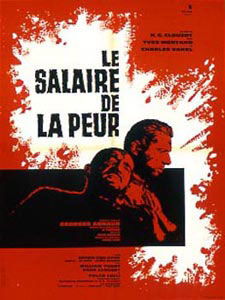A blog formerly known as Bookishness / By Charles Matthews
"Dazzled by so many and such marvelous inventions, the people of Macondo ... became indignant over the living images that the prosperous merchant Bruno Crespi projected in the theater with the lion-head ticket windows, for a character who had died and was buried in one film and for whose misfortune tears had been shed would reappear alive and transformed into an Arab in the next one. The audience, who had paid two cents apiece to share the difficulties of the actors, would not tolerate that outlandish fraud and they broke up the seats. The mayor, at the urging of Bruno Crespi, explained in a proclamation that the cinema was a machine of illusions that did not merit the emotional outbursts of the audience. With that discouraging explanation many ... decided not to return to the movies, considering that they already had too many troubles of their own to weep over the acted-out misfortunes of imaginary beings."--Gabriel García Márquez, One Hundred Years of Solitude
Monday, April 10, 2017
The Wages of Fear (Henri-Georges Clouzot, 1953)
With John Huston's The Treasure of the Sierra Madre (1948) and Sam Peckinpah's The Wild Bunch (1969), Henri-Georges Clouzot's The Wages of Fear forms an unholy trinity of adventure films. All three are about soldiers of fortune in Latin American countries seen as ripe for the pickings by predatory outsiders. Clouzot's film is probably the most deeply cynical of the three: Houston at least lets two of his adventurers survive, and Peckinpah's bunch at least shows some sympathy for the exploited poor. But from the opening of Clouzot's film, in which a half-naked child is seen tormenting some cockroaches (a scene Peckinpah borrowed for his film's opening), we are in hell. The unnamed country is being plundered by the Southern Oil Company, known by the acronym SOC, pronounced "soak." The S and the O, however, suggest Esso, the old trademark of Standard Oil before it and Mobil morphed into the double anonymity of Exxon. An oil well is on fire 300 miles away from the SOC headquarters, which lie on the outskirts of an impoverished village, and the easiest way to deal with the fire is to seal it off with explosives. So the foreman at the headquarters, Bill O'Brien (William Tubbs), proposes sending a couple of trucks cross-country, laden with nitroglycerin. Union drivers would balk at such dangerous work, so the company hires some of the local layabouts: Mario (Yves Montand), a swaggering Corsican; Jo (Charles Vanel), a French gangster from Paris; Luigi (Folco Lulli), an Italian who has just learned that he has a terminal lung illness from his work handling cement for SOC; and Bimba (Peter van Eyck), a German who survived forced labor in a salt mine under the Nazis. All three have been idling in the village waiting for the big break that will allow them to leave, and this seems to be it. Desperation at getting out is so intense that one of the men who vie for the job commits suicide after he fails to land it. The journey is, to say the least, harrowing, and Clouzot, who adapted the screenplay with Jérôme Géronimi from a novel by Georges Arnaud, makes the most of every nail-biting moment of it. As a director, Clouzot is as smart in what he chooses not to show us and in what he does. Jo, for example, is not the first choice as a driver: O'Brien goes with a younger man. But when that man doesn't show up on the morning of departure, Jo takes his place. We don't see what Jo did to eliminate or delay his rival, but we're sure it wasn't good. And when one of the trucks explodes, we don't see the buildup to or the cause of the explosion: We witness it from a distance, and then join the surviving truck drivers as they come upon the scene, which they treat as just another hazardous obstacle on the road. The Wages of Fear was heavily cut on its first American release: The portrayal of American capitalism didn't sit well in the era of HUAC investigations. Clouzot's nihilism in The Wages of Fear sometimes feels a little heavy: One character actually dies with the word "nothing" on his lips. The screenplay for The Wages of Fear lacks the polished wit of The Treasure of the Sierra Madre, which also contains the great performances of Humphrey Bogart, Walter Huston, and the undervalued Tim Holt. And The Wild Bunch displays Peckinpah's great narrative drive and unequaled handling of action sequences. But Clouzot's film easily belongs in their company, and its uncompromising darkness makes many think it the best of the three.
Links:
Charles Vanel,
Folco Lulli,
Henri-Georges Clouzot,
Jérôme Géronimi,
Peter van Eyck,
The Wages of Fear,
William Tubbs,
Yves Montand
Subscribe to:
Posts (Atom)
